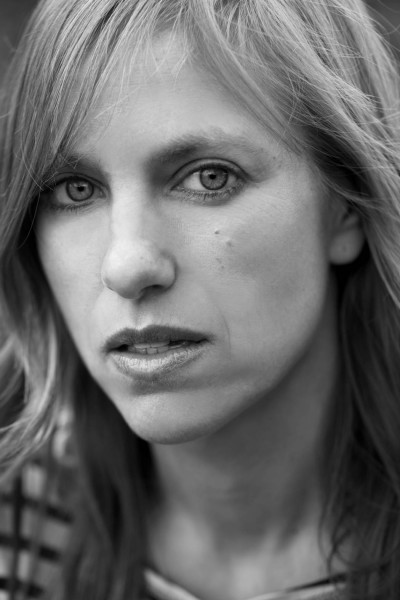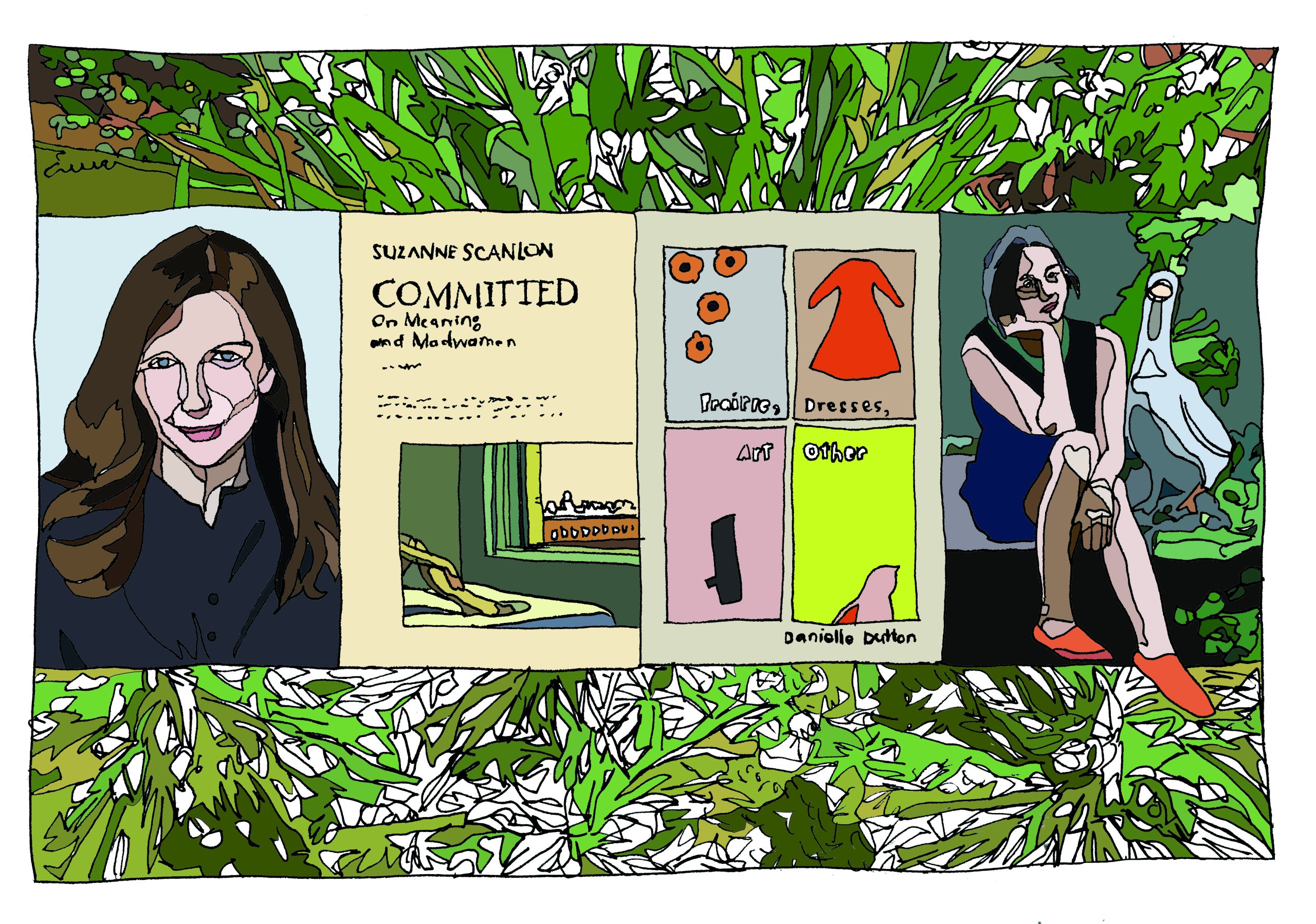interviews
INTERVIEW! Heidi Julavits, Author of The Vanishers

Photo by Jill Goldman
Somewhere in between co-editing The Believer, teaching MFA students the wonders/horrors of fiction writing, and being one-half of the literary power couple that is herself and Ben Marcus, writer Heidi Julavits has published her fourth novel, The Vanishers, which came out this March on Doubleday.
The Vanishers tells the story of Julia Severn, a young student at the most acclaimed psychic institute in the world. She finds herself the victim of a psychic attack, brought forth by her ex-mentor at the institute, and, throughout the majority of the book, Julia is struggling to break free from the attack. In between, there’s time traveling, plastic surgery, spas, missing mothers, phantom e-mails, and people who disappear from life by their own choosing. Sound weird? It is. It’s also delightfully readable — I found myself doing dangerous things with the book, like walking and reading at the same time. And, of course, it features Julavits’ signature expertly-crafted sentences, which are a joy to read in themselves. I got a chance to ask Julavits a few questions about the book, as well as a couple other very important topics, like fashion and mental illness.
Julia Jackson: I feel like it’s such an obvious question, to ask how ideas from a book came to you, but the thing that struck me most about The Vanishers was how imaginative it is so I have to ask anyway: What were the first seeds of the the psychic institute plot line? And that of the vanishing from life?
Heidi Julavits: The psychic attack thing (and the opening chapter, where there’s a bitter conflict between mentor and mentee at a psychic institute) came to me via a book called Psychic Self Defense by Dion Fortune, which is basically a ’30s occult self-help book. It has the same cover as AS Byatt’s Possession, so if you’re reading it on the train, your co-riders might not suspect you to be a health risk, and move away.
The vanishing films — I’ve been trying to remember where that idea came from! In part I was interested in the notion of “lost films” — because nothing is lost these days, everything is found and on YouTube. I liked the notion of reestablishing the value of scarcity — these are films that can only be seen in the vault where they’re kept, which is in Cincinnati. And the people on the films are also lost, at least to the viewer, because they’ve changed their names and disappeared into another life.
I wanted these films to function as testaments from the dead, except that the dead were still alive. And how that alive-deadness really complicates the grieving process of the family and loved ones left behind.
JJ: Do the psychic/paranormal aspects of the book coincide with your own spiritual beliefs? Have you experienced anything creepily unexplainable?
HJ: The psychic stuff, to me, is analogous to the way I relate to my own past. Aren’t we all cut off from past (and thus, we fear, dead or un-recapturable) versions of ourselves, at least until we hear that John Cougar Mellencamp song (you know the song I’m talking about) and are instantaneously transported to a high school kegger in the woods, where the guy we liked was flirting with the feathered hair cheerleader, and we felt both heartbroken and really fucking alive in a way, now that we drink bottled artisanal IPAs and our love life is basically unthreatened by girls with dated hair, we so rarely feel?
So the notion of psychically transporting yourself to another time and place — yeah. I think that happens to people all the time, albeit accidentally. You can only play that John Cougar Mellencamp song so many times until it loses its power and becomes part of your “now” life. It’s no longer a portal to the past. It’s not dissimilar to the Pevensie kids and their magic wardrobe. You can’t just go to Narnia whenever you feel like it.
JJ: I heard in an interview that one of the impetuses in the psychic attack element of the book was that a friend was sick with an undiagnosable illness, and watching how the treatment from others changed from sympathy to disbelief. This reminded me of some of the common misconceptions of mental illness, which coincided nicely with your references to Sylvia Plath’s The Bell Jar. Does this association make sense to you? Was there some other reason why The Bell Jar seemed to relate to the story that you were telling?
HJ: I’m mentally ill and nobody thinks otherwise, so I can’t claim any personal relationship to that kind of misunderstanding. The Plath fixation comes from that most cruel/thoughtful detail of her suicide — she killed herself while her kids were upstairs, but she wedged a towel under their bedroom door and left them a plate of toast. That kind of maternal abandonment is typically met with disbelief, and even a bit of judgement. How could a woman do that? I wanted to spin that decision as a form of sacrifice, at least for the mother character in my book — look at what she was willing to give up by dying — her own child — in order to spare that child any future exposure to her sick mother self.
JJ: The book is clearly about complicated relationships between females, especially those with elements of envy running so deep they border on sexual. What do you think it is about women that causes us to be, at times, so cut-throat and competitive in such subtle and yet destructive ways?
HJ: I think that women are just as cut-throat and competitive as men, but when men are cut-throat and competitive, it’s part of being a Man, which we can trace all the way back to the cave days, or at least the days of the recent banking crisis. When women behave that way, there’s something peculiar about it, or anti-woman about it. What interests me is the covert ways women express this aggression. They don’t beat each other with clubs, and that more repressed approach can at times become subterraneanly sexual. Though I think club-beating can be sexual, too. I recently googled some YouTube videos of men singing rugby songs — they’re so homo-erotic! Guys gleefully singing about touching each other’s balls.
JJ: Your marriage with Ben Marcus makes perfect sense to me when I look at your writing. Do you help each other out with the writing process? Do you ever get competitive? How does having two writers for parents effect your children (I mean, besides the obvious, like the fact that you sit in quiet for long hours at a desk)?
HJ: It’s hard to be competitive with him because he makes me, many times a day, laugh so hard I’m always half-choking on my coffee or my take-out dinner. So that’s one downside to our busy life — too much take-out in a neighborhood that’s not very culinarily advanced, and basically sells nothing except lots and lots of cheap, plastic-wrapped brie. Our daughter, unfortunately, shows no talent whatsoever save in the area of writing. I feel less badly for her than I do for us, and what this says about our apparently very limited gene pool.
JJ: When you taught at Brooklyn College, I always noticed your shoes. I’d like to see society view writing as a profession that has the glamorous, stylish, interesting cachet it once held — and clearly having great shoes has an important role. Have you bought any clothing or accessories recently that you love? Do any local shops or designers have a dear place in your heart?
HJ: I think my first husband gets credit for this now-mantra of mine, but — you can get away with anything if you’re wearing a nice (usually expensive, unfortunately) pair of shoes. So back when I was a waitress, I spent all of my clothing budget money on shoes — there was a French brand called “Freelance” (the irony of the name only striking me RIGHT NOW) we all coveted — -the boots were so expensive my friend referred to them as “Wallet Lance” — -but I could spend about five dollars on my actual clothes if I was wearing nice boots, so I think, in the end, the economics of the situation worked out pretty evenly per square body inch.
As for what I’m wearing usually these days (now that I spend money I don’t have on above-the-ankle stuff too) — -A Detacher, Marni, Steven Alan, and vintage stuff — these are the four points of my closet compass at the moment. I recently bought a Marni bib necklace made of crocheted wool, and sawed-off chain links, and lots of brass bells. Sounds weird. Is weird. I love it.
JJ: What writers and books have influenced you deeply, both in general and specifically for The Vanishers?
HJ: I’m going to say John Saul!!! Check out this description of Suffer the Children — sounds familiar, does it not?
A novel of unnatural passion and supernatural terror.
One hundred years ago in Port Arbello a pretty little girl began to scream. And struggle. And die. No one heard. No one saw. Just one man whose guilty heart burst in pain as he dashed himself to death in the sea.
Now something peculiar is happening in Port Arbello. The Children are disappearing, one by one. An evil History is repeating itself. And one strange, terrified child has ended her silence with a scream that began a hundred years ago.
JJ: Ben has been busy with his book, and now you’re busy with yours. What’s next, after all the dust settles — a) a family vacation, b) another book, c) both, or d) none of the above?
HJ: I am going to clean my desk. On it there are twelve miniature bowling pins, and stolen hotel shampoos, and a pair of broken sandals, and a bunch of hand wipes from a lobster shack I haven’t been to at all recently. That’s the first layer of crap. Who knows what’s deeper down — a really big check I forgot to cash? Some crackers?
***
— Heidi Julavits is the author of four novels, The Mineral Palace, The Effect of Living Backwards, The Uses of Enchantment, and The Vanishers, as well as a collaborative book, Hotel Andromeda, with the photographer Jenny Gage. She is a founding editor of The Believer, and her writing has appeared in Esquire, The New York Times, McSweeney’s, and Time, among elsewhere. She lives in Manhattan and Maine.
— Julia Jackson is the editor of Electric Dish. Find her on the internet here.









